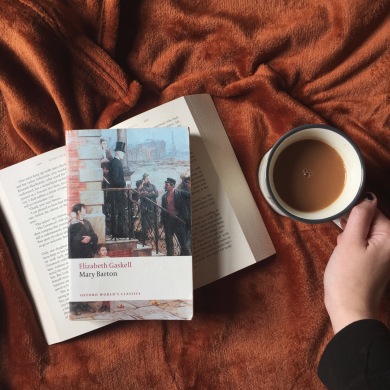
Rating: 4 stars
Read: 3 September – 8 September, 2018
‘Don’t think to come over me with th’ old tale, that the rich knows nothing of the trials of the poor; I say, if they don’t know, they ought to know. We’re their slaves as long as we can work; we pile up their fortunes with the sweat of our brows, and yet we are to live as separate as if we were in two worlds…’
During the first few weeks of September, I felt myself steadily declining into a reading slump. I’ve read so much this past year, and I think it’s finally catching up to me. Despite it taking me longer than usual to read a book of this length, I think Mary Barton stopped me from sinking into that hole. It was an interesting tale, and goes a little something like this…
Set in Manchester in the 1840s – a period of industrial unrest and extreme deprivation – Mary Barton depicts the effects of economic and physical hardships upon the city’s working class community. Running alongside this is the story of Mary herself: a factory worker’s daughter who attracts the attention of two opposite men. She soon becomes caught up in the violence of class conflict when a brutal murder forces her to confront her true feelings and allegiances.
In short, I think this a wonderful novel. It discussed contemporary social, economic and political issues in a sensitive and enlightening way. Manchester, just like many industrial towns, wasn’t a loving community. People were out for themselves, and Gaskell depicted this in full. She didn’t shy away from being direct – pompous rich factory owners only cared for themselves and factory workers would go to such lengths to dismantle their power. Out of all the Victorian writers I’ve read, Gaskell is the best at criticising class conflict in industrial Britain.
I also really appreciated the focus on the Lancashire dialect. As someone from this corner of the world (I know Manchester is no longer a part of Lancashire but it was!), I felt connected to the novel. It felt personal and intimate. It was interesting to see some of the slang and regional words that I still hear and use today written in a story from 170 years ago. This played a huge part in my enjoyment of the novel, and I don’t think I would have connected with it as much otherwise.
The only thing I didn’t like about Mary Barton was the recycled subplots. I felt like I’d read this all before in North and South but switched around. Instead of this happening to a man of this class, it happened to a man of an opposite class. A key character played a huge role in acquitting someone of murder but chose to keep it quiet. The relationship between factory workers and owners were discussed at length. I could go on and on. I don’t mind this, but I thought it a little lazy and repetitive.
Considering this was Gaskell’s debut novel, I think it’s very telling of her ability as a writer. She often, more times than not, goes against the grain. She lived in Manchester, at the heart of the industrial revolution, and saw the negative impacts it had on the lives of the working class. She used literature as her tool; to criticise the middle-class and advocate for change. I think she’s a marvelous writer, and deserves all the credit for her words. A fascinating read, and one that I would encourage you to read.
Have you read Mary Barton? or any other Gaskell novel? What do you think of them? I’d love to discuss it with you!
Thanks for reading, Lauren X
❤️❤️
LikeLike